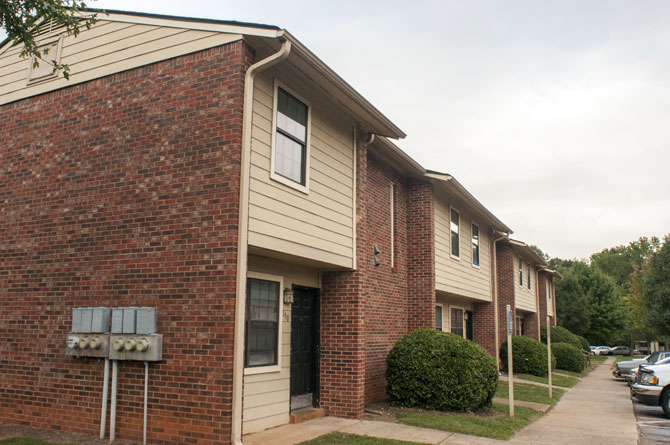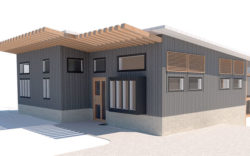As apartment complexes continue to transform the downtown skyline, Athens officials have decided it’s time to take an inventory of housing options in town and figure out what development is needed next.
Athens-Clarke County commissioners in April approved funding of a workforce housing study that will look at quantity, size and affordability of homes in Athens. Last week, the county sent out a call for consultants’ bids to get the process started.
“This assessment should identify the housing needs of our community based on socioeconomics, regional growth projections and the different market segments,” says Rob Trevena, Director of the ACC Housing and Community Development Department, who is heading up the process. “We want it to provide detailed information about our current housing stock, assess general housing conditions and project future housing needs.”
A major factor driving the push for a study is the recent development of new apartments downtown geared toward students and more affluent renters. What happens when older apartment complexes in town aren’t as popular, become rundown or draw crime? Athens officials want to find the answers before this happens.
“Many of these complexes aren’t family-oriented. The floor plans have a bathroom in every bedroom and small kitchens,” Trevena says. “We need to look at the unique aspects of the Athens housing market and address the changes so we’re not closing opportunities to the workforce who need places to live and work in town.”
Affordability’s an Issue
Trevena and colleagues developed an affordable-housing survey for Athens-Clarke County in 2002 and have wanted an updated assessment from an outside expert for years. The previous analysis questioned whether enough affordable housing, both single-family and multi-family, existed in Athens. It also investigated the number of units that were in “decent, safe and sanitary conditions” for residents to rent.
That study found ACC didn’t have a housing shortage. There were plenty of available units, but the condition and location often played a role in whether residents actually wanted to live there. In addition, affordability continued to be a problem for the workforce group—those who earn 30 percent or less of the median area family income. At that time, nearly 6,000 people, or 29 percent, of Athens families fell below the income threshold required to rent or own more than a two-bedroom home.
Compared to other Georgia cities, such as Albany, Macon and Savannah, Athens had the highest occupancy rate, lowest vacancy rate, highest rental-occupied rate and lowest family home ownership rate at that time. And, no surprise, the study highlighted that the student population “has a significant impact” on the housing market.
“Evidence indicates that ACC’s housing demand will continue to grow at a rapid pace,” Trevena wrote in the 2002 report, noting that only those making more than 50 percent of the median area income can afford most available places. He suggested four strategies to make housing options more affordable and available—use private and public funding to reduce the cost of construction, develop subsidies to fund future developments with units for low income families, strengthen programs for homeownership education and provide job opportunities and job training for Athens families to get better jobs and increase their income.
More than a decade later, those concerns still loom large. “Is there sufficient and available housing to support ACC workforce housing needs, and if not, what can be done about it?” Trevena says.
In 2005, the Athens Housing Authority hired John Wall & Associates, a South Carolina-based market analysis and data mapping firm, to study multi-family housing in Athens. Looking at 24 major complexes around the county, the study identified the type of property (student or family, full-market price or subsidy) and characteristics such as location and condition. With heat maps in hand, AHA officials saw that most multi-family complexes are on the southeastern side of the county, with few on the northwestern side.
“I’ve been advocating for a housing study for two decades,” AHA Executive Director Rick Parker says. “I’ve seen the benefits it can have in other communities.”
While planning for this fall’s study, the housing authority provided its results and maps to ACC officials as a starting point. But nearing a decade since the 2005 study, Athens is due for an update, especially following a recession that affected new construction and real estate trends in town. And it’s slated to be the most comprehensive study yet.
“The problem with any issue, such as housing, poverty, food and transportation, is that you need to make sure you’re doing the right things for your community,” Parker says. “All too often, what we think is the problem may not be the problem. Data is how we focus our efforts.”
The study will help Athens housing leaders determine whether the main concerns should be about home ownership, affordability, housing options for seniors or multi-family rentals, Parker explains. Otherwise, government and nonprofit groups are wasting money and time.
“Failing to study or understand the problem can waste a lot more money by attacking the wrong problem,” he says. “If our problem is that we have vacant houses that are substandard, we can focus on a rehab strategy rather than a construction strategy.”
Developing Solutions
Once the study is complete, Trevena, Parker and other housing officials want to submit an application to the 2015 Georgia Initiative for Community Housing, which provides technical assistance to help communities create and launch locally based plans to meet their housing needs. It’s a three-year program that highlights collaboration and technical assistance to get the plan in place. With the workforce housing study in hand, ACC officials can argue strongly about their needs and back up the request for funding with data.
They’ll also begin to develop solutions to the concerns that pop up in the survey. In the meantime, residents and officials can start the conversation about what they’ve seen in the housing market in recent years, says Spencer Frye, Athens Area Habitat for Humanity executive director.
“The No. 1 thing we have in this community is a glut of apartment complexes and one of the lowest homeownership rates in the state,” he says. “We have a population that wants to rent rather than buy, and that means multi-family construction is geared toward rental housing and students.”
Frye has carefully watched the new student-geared complexes pop up downtown. Like many others, he’s worried that the additional 2,000 bedrooms will pull residents downtown and cause them to leave complexes empty on the outside of town.
“They’re going to start deteriorating, and in theory, move toward lower rent, lower maintenance and more crime,” he says. “How do we prevent our large multi-family units from becoming housing deserts or low income areas?”
One way is to stop building complexes, Frye says. With a surplus of rooms, apartment owners don’t have an incentive to maintain upkeep of older buildings. But it’s tough to stop building when new influxes of residents want the latest in student living, giving developers hefty incentives to build new complexes and renters who can afford it hefty incentives to move in.
Another possible solution is creating job opportunities for poorer residents. Simply put, workforce housing is affordable if the population has the income to afford it, Frye says. Though the county has one of the lowest unemployment rates in the state, it has one of the highest poverty levels, meaning many jobs are low-paying. It’s a long-term strategy, but it is one to consider.
A third strategy—and one that’s worked in Athens before—is to focus on neighborhood revitalization. In the past few years, Habitat for Humanity rehabilitated rental properties in East Athens, cutting down on drug trafficking and prostitution in the area. Through a land acquisition program, Habitat bought a 16-unit East Broad Street apartment complex that had 500 calls to 911 in 18 months, refurbished it and rented two-bedroom units for $250–$300 per month. Then Habitat bought 10 duplexes on Simmons Street and did the same. The organization used the rent money from those properties to invest in a single-family neighborhood on nearby Carpenters Circle and created new construction for approved homeowners.
“We decided the best way to change the problem was to control the land,” Frye says. “By controlling properties on just those three blocks, we stabilized the neighborhood to the point that homeowners there have told us it’s easier to walk down the street, and it’s a whole different neighborhood.”
Changes, but Small Ones
As housing leaders debate the problems and solutions, all residents must remember to keep a broader prospective on housing issues, says Jack Crowley, University of Georgia professor of planning and development. Crowley worked with the Athens Downtown Development Authority to create a downtown master plan. He recognizes the town’s competing interests of student housing, retirement living and multi-family units for workers.
“We’re going to see the cost of living continue to increase here over time,” he says. “That’s going to get tough for those workers in the gap between public housing and market-rate housing.”
This group tends to find homes in Morgan, Oglethorpe and Barrow counties and commute into Athens for work, he says. As more manufacturing jobs come to the area, this trend will continue, unless Athens builds more affordable three-bedroom homes. In addition, Atlanta’s job and housing markets will influence Athens more in the future, Crowley predicts.
“That metro region is growing, and it has influence on what we pay for everything, including housing,” he says. “I used to say that we’re only two cows away from Atlanta. Well, one of those cows is really sick now.”
In the upcoming housing assessment, Crowley wants to see case studies of other college towns and similarly-sized cities that have addressed the workforce housing question. He also wants to know more about the new student apartment complexes and how they will change the downtown scene for the better.
“In my opinion, if we want a grocery store downtown, the student is the pioneer population that will attract those food companies,” he says. “And though we do need more housing on the Eastside and Westside for workers, we’re not going to see a lot of building away from the downtown for the next few years.”
For the most part, Crowley doesn’t see the student complexes taking down the housing market as we know it. It’s a phase that will pass as Athens continues to adapt its housing needs, he says.
“We may see a little sag on the Eastside for a bit as some units are repurposed or taken out, but we won’t see a mass exodus to downtown or massive amounts of vacancies,” he says. “The new places bring in 2,000 beds. Compare that to our entire market on the Eastside or Westside. I’m not worried.”
Like what you just read? Support Flagpole by making a donation today. Every dollar you give helps fund our ongoing mission to provide Athens with quality, independent journalism.










